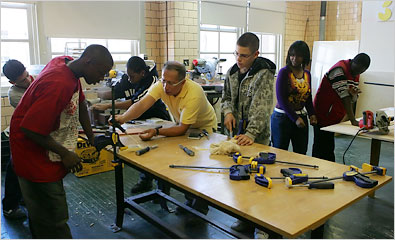Knowing vs. Doing: How Vocational Education is Changing the Employment Game!
 Vocational education is gaining rapid popularity on the national landscape as a respectable and viable option to mainstream college education.
Vocational education is gaining rapid popularity on the national landscape as a respectable and viable option to mainstream college education.
Getting a bachelor’s degree, even as recently as a decade ago, was the only way to go if people wished to build a career here in the United States.
Vocational training was thought of as a lesser form of learning, meant for those weren’t quite sharp enough to succeed in college.
Slowly but surely, this position has changed over the last few years though. In the beginning of last year, President Obama touched upon this topic too. He said, “A lot of young people no longer see the trades and skilled manufacturing as a viable career.
Vocational Education Desperately Needed
But I promise you, folks can make a lot more, potentially, with skilled manufacturing or the trades than they might with an art history degree. Now, nothing wrong with an art history degree — I love art history. So I don’t want to get a bunch of emails from everybody.
I’m just saying you can make a really good living and have a great career without getting a four-year college education as long as you get the skills and the training that you need.”
Vocational Education
Vocational training can prove to be more beneficial than a traditional bachelor’s degree in modern times for a few reasons. First off, cost and time.Vocational training is the cheaper option by far when compared to traditional bachelor’s degree programs.
Because the training is so focused and only teaches what you need to know to succeed in the particular field you’re studying for, usually,vocational courses take about half the time of a bachelor’s. Two years is pretty much the maximum for trade school programs, whereas an average bachelor’s degree takes four years.
Obviously, the extended period means higher tuition fees and more spent for living on campus, etc.Another aspect to be factored in is that the sooner you graduate, the sooner you can start earning – so those two years saved in a vocational course, aren’t just two years where you don’t need to pay for education, but is also a two year head start into earning money and making a living.
Then there’s the matter of job openings. In today’s financial climate, professionals, even those with formal educations from colleges are being laid off.
You read about these accounts ever so often, but curiously, skilled trades workers aren’t usually laid off in similar circumstances. Take Carmel Kalisky’s account from Marinello.com for example.
Kalinsky used to work in corporate accounting for a number of years until they laid her off. Being a single mother and unable to find a job, she had to do something to feed herself and her child, and quick.
Adult vocational education consultation must tackle skills …
She decided to explore beauty career opportunities, got a vocational degree, got placed from the institute itself, and is now climbing the ladder of success in the world of styling. The numbers bare out too, because according to this study by the Bureau of Labor Statistics projected job growth by 2020 is 18% for vocational courses, and 16.5% for bachelor’s degrees.
Interesting the median wages for both vocations are pretty similar to each other as well, with Bachelor’s degrees median standing as of 2010 being at$63,430 annually as opposed to those earned through associates degrees (degrees earned from vocational courses) – $61,590 according to the same study.
That’s not much of a difference at all, especially considering that students taking vocational courses aren’t saddled by education loan payments like their bachelor’s degree counterparts.
Clearly, vocational training has a lot of plus points that give it an edge over bachelor’s degree programs, and should be seriously considered as an option for career advancement by those seeking to gain a post-high school education.
Category: Education




